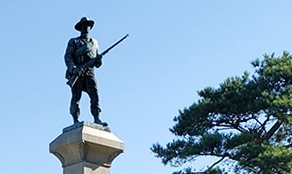An organizer considers his and his town’s past as he confronts a time of political division.
By Ryan Wegener
Beacon Media

Most Confederate monuments face North to represent defending against the Union during the Civil War.
Before it was taken down, the Confederate monument in my home county of Franklin, N.C., faced South.
That was intentional. From the town square in Louisburg, most neighborhoods on the north side of town have been majority white, while the South side of town has been majority Black. The people who put up that monument knew what they wanted those coming from the South to see — and the monument was visible from far down Main Street.
You could be a couple miles away down on South Main Street and still see the top of that monument.
In 2020, I worked with a group of my former high school classmates and community members who organized to put pressure on town leaders to bring that monument down. And we did. In June 2020, the Louisburg Town Council decided 4-3 to move the monument.
Honestly, I never thought that would be possible. It’s a reminder that even things that stand in stone don’t have to last forever.
I’ve been thinking about that because a lot of folks are wondering how we bring people together in a time when we feel as divided as ever. I’m someone who understood the appeal of both Donald Trump and Bernie Sanders. Both sides of our broader political debate have actually identified the same things: the same corruption, the same greed that has taken over too much of our politics.
The hardest part is that when it comes to addressing those issues, it’s going to take a lot of work for us to have a shared reality. There are a lot of lies and a lot of propaganda to cut through.
I’m a political organizer and I work on campaigns, so I’m close to these issues. But the thing that I try to get people to see is how personal politics is to their lives.
For me, it became personal when my mom was diagnosed with cancer when I was a child.
I won’t go into the whole backstory, but there was a time when I remember our whole lives could be upended because of my mom’s illness. My parents had gotten divorced and my mom’s health insurance had come from my dad and his union job’s benefits.
Would we have to move in with my grandmother so she could afford treatments? Would she even qualify for affordable insurance or would companies use her diagnosis as a “pre-existing condition?”
It was then that I realized how insane it is that the right to get medical care — or just to have insurance and be able to reasonably access care — is tied to a job in this country.
I guess the experience shocked me into realizing how insane that was. My mom was doing the best she could while caring for me as a single mother with her own health challenges. I think America should be a place where no matter what someone is experiencing with their health, it should not threaten their financial stability or their home.
These days, it is becoming harder to reach people with that message. They assume you have some other motive or have bought into a politics that focuses on our differences rather than our similarities.
But in those moments, I remember that Confederate statue. Change isn’t reserved for big cities or powerful politicians. It happens in small towns, in school board meetings, in local elections. It happens when people realize they don’t have to accept things as they are. If a group of determined residents can move a monument that stood for over 100 years, what else is possible?

Ryan Wegener is an organizer for Down Home NC and political strategist from Franklin County, N.C.